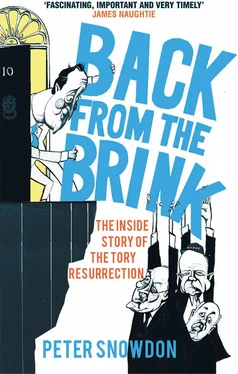Cameron’s project to modernise the party has given it a new lease of life, yet at times it has seemed perilously close to falling apart. There have been three moments when his leadership was under severe pressure: after Gordon Brown became Prime Minister in June 2007; in the immediate aftermath of the financial crisis in October 2008; and during the expenses crisis in May 2009. On each occasion, the Conservative Party’s recovery was at stake, as was Cameron’s authority as leader. The fact that the Cameron project was in peril on each occasion exposes the flaws in the party’s strategic direction, but at the same time it throws light on the tactical agility of its leadership in bouncing back.
David Cameron’s mission to revive the fortunes of the Conservative Party has encountered reversals, yet it remains intact. Whether voters believe that he and his party are ready to take on the responsibility of governing the country is still to be seen. In Gordon Brown, the Conservatives face a battle-hardened Prime Minister who has been at or near the summit of British politics for the best part of two decades, both in opposition and in government. Brown is a great survivor: he has seen off two plots from within his Cabinet to remove him in the last two years. For the man Cameron describes as ‘a steamroller who just keeps going’, the general election will be a hard-fought battle to the end.
Much is at stake for both the old warhorse and the young pretender of British politics. For Brown, leading Labour into a fourth term would represent the most impressive recovery by an incumbent government in modern history. For Cameron, forming a government would end the longest uninterrupted period in opposition his party has endured since 1832. A fourth successive election defeat, however narrow, would represent a massive failure for everything Cameron has sought to achieve in the past four years, and would reduce the party to a state of acrimony and division. If the Conservatives cannot win amidst the economic gloom that pervades the country in 2010, when can they?
Based on more than 120 interviews with figures from across the Conservative Party – from successive leaders to representatives of the grassroots – this book tells the story of how a once formidable fighting force in British politics stared into the abyss before making its way back to be in contention for power. By talking to a wide range of party insiders, both on and off the record, I hope to have built up a candid and unvarnished account that sheds new light on a dramatic tale of decline and renaissance.
The Conservative Party may have come back from the brink of disaster, but rediscovering its winning formula has been far from easy. As David Cameron and his party prepare for their steep climb to the summit in the months ahead, it would probably be best if they did not look down. Theirs has been a long, harsh and often painful journey. I hope that readers will find it a compelling one.
Peter Snowdon
December 2009
Конец ознакомительного фрагмента.
Текст предоставлен ООО «ЛитРес».
Прочитайте эту книгу целиком, купив полную легальную версию на ЛитРес.
Безопасно оплатить книгу можно банковской картой Visa, MasterCard, Maestro, со счета мобильного телефона, с платежного терминала, в салоне МТС или Связной, через PayPal, WebMoney, Яндекс.Деньги, QIWI Кошелек, бонусными картами или другим удобным Вам способом.












